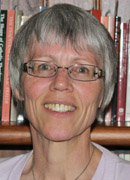By Barb Arland-Fye

Pope Francis has zero tolerance for hunger in the world and its partner in crime, food waste. Guilty as charged. I’ve thrown away forgotten leftovers and left food on my plate at restaurants.
My prayer life has heightened awareness of this sinful habit and the need to break it. The Holy Father believes prayer is a powerful tool, and has called for worldwide prayer at noon Dec. 10, local time, to move all of us to work towards ending hunger.
In his newly released Apostolic Exhortation Evangelii Gaudium, Pope Francis devotes a section to inclusion of the poor in society and quotes a 2002 statement by Brazil’s bishops. Speaking of Brazilians in need, the bishops said: “…Seeing their poverty, hearing their cries and knowing their sufferings, we are scandalized to know that there is enough food for everyone and that hunger is the result of a poor distribution of goods and income. The problem is made worse by the generalized practice of wastefulness” (EG #191).
In his annual message for World Food Day, Oct. 16, the Holy Father called the waste of food “one of the fruits of the ‘throwaway culture’ that often sacrifices men and women to the idols of profit and consumption …” (Catholic News Service, Oct. 16).
Pope Francis’ prayer initiative to focus global attention on hunger will involve more than 164 countries, beginning on the Island of Samoa and progressing around the world, says Joan Rosenhauer of Catholic Relief Services (CRS).
Here at diocesan headquarters in Davenport, Bishop Martin Amos will lead chancery staff and invited guests in prayer at noon Dec. 10 in the chapel. Guests include members of the U.S. House and Senate (or their designated staff) who serve the people in our diocese, said Kent Ferris, diocesan director of Social Action and Catholic Charities.
“Just before prayer, more information will be shared about Pope Francis’ intentions and our concern that decisions relating to the (stalled) Farm Bill will help the hungry in our country and around the world,” Ferris told me. The Senate version of the Farm Bill would cut $4 billion from the Supplemental Nutrition Assistance Program (SNAP) and the House version would cut nearly $40 billion over the same period.
An op-ed piece by two Georgia bishops provides sobering perspective: “The Catholic Church runs many food pantries and other programs that help the hungry. However, all the food pantries out there are not going to be able to fill the hole that cuts to SNAP will leave,” wrote Archbishop Wilton Gregory of Atlanta and Bishop Gregory Hartmayer of Savannah in a Savannah newspaper (Catholic News Service, Nov. 20).
International aid is also a component of the Farm Bill, and hungry people around the world depend on it. Feeding the hungry — at home or abroad — “is about the preferential option for the poor,” Ferris said, referring to a principle of Catholic social teaching.
In addition to organizing the prayer gathering at diocesan headquarters, Ferris and other diocesan leaders are working to get prayer resources out to parishes, schools, groups and individuals.
“My guess is that this prayer initiative is not the last we’ve heard from Pope Francis on this issue,” Ferris continued. He anticipates greater clarity in the coming months as to “what Catholic Charities will be doing, what our charge is going to be, what we incorporate from what the pope is saying in order to address the needs of the poor.”
Rosenhauer, the executive vice president of CRS, speaks fervently of the united voices around the globe launching a movement “that will not rest until there are no more hungry children.”
In the meantime, CRS continues its efforts to strengthen agricultural programs that address the root causes of hunger in vulnerable populations around the world. Readers are invited to visit the CRS website at www.crs.org for ideas and resources.
Now, I’m more aware of my own consumption and that we are indeed one human family and that there must be food for all.







